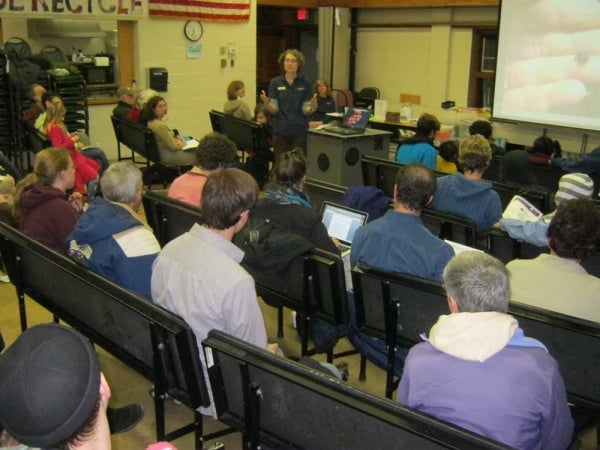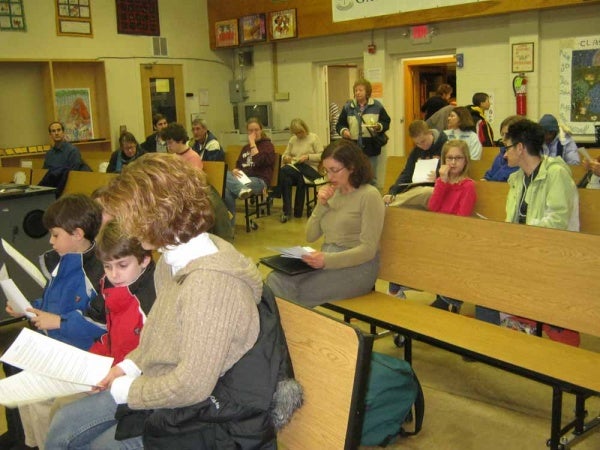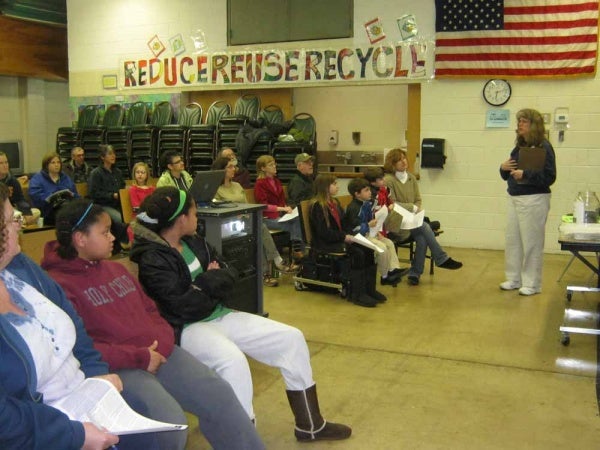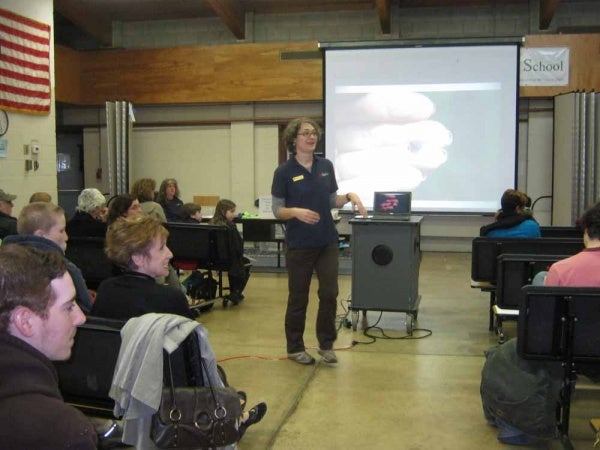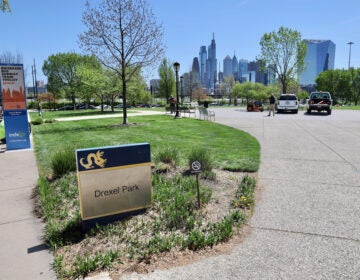Toad Detour training kicks off at the Schuylkill Center
“Every American Toad in the history of American Toads has made this journey to water,” Schuylkill Center Director of Education Gin Ranly said on Wednesday to a crowd of 60 at Roxborough’s official Toad Detour training session.
“Our toads just happen to be migrating through upper Roxborough at rush hour,” she added.
The tradition
Founded three years ago by Lisa Levinson, the Toad Detour is fast becoming a treasured Roxborough tradition, as residents of all ages participate in temporary police-sanctioned detours on roads that run between the reservoir and the Schuylkill Center woods, home to droves of toads. Upon Levinson’s departure for the West Coast late last year, the Schuylkill Center for Environmental Education has stepped up to adopt the program.
At the official kick-off session on Wednesday, Ranly gave an interactive lesson on the toad life-cycle to a group of all ages, some of them long-time toad supporters, and some hoping to help out for the first time.
As amphibians, toads need water – in this case, the disused Roxborough reservoir – to reproduce. The well-known American Toad hibernates deep in the soil until March temperatures bring them to the surface, ready to make the next generation. Session attendees learned all about toads and why it affects the local ecosystem when cars don’t make way for the annual migration. Adult toads make their way en masse to the reservoir between March 1 and April 15, and tiny toadlets make their way to the woods between May 15 and June 30. Volunteer shifts last from approximately 7 to 9 p.m. and meet at the corner of Port Royal Avenue and Hagys Mill Road.
Schuylkill Center Volunteer Coordinator Claire Morgan explained the family-friendly duties of Toad Detour volunteers: setting up and manning temporary barricades, communicating politely with motorists, recording weather conditions, helping to keep track of toad numbers, and observing the “Toad Code”: no profanity, drinking, or harassment of motorists and fellow volunteers. For everyone’s safety, each station of the Detour is manned by at least two people.
Before the detour began, migrating toads were squashed by the hundred, and last year, when the migration began slightly earlier than volunteers anticipated, 100 toads were killed before the barriers went up. In 2009, volunteers counted almost 600 toads in 15 days, and then over 2,000 in 20 days the following year. It seems that efforts to protect the toads are paying off, and local residents should be glad – the toads love to lunch on mosquitoes.
How it has changed
Morgan emphasized a few key differences in how the Detour will operate under the Schuylkill Center. For the first time, volunteers will be able to easily enroll and schedule their shifts online via VolunteerSpot.com, available on the Schuylkill Center website. A new Toad Detour Facebook page with links and updates will be launching soon. An unlimited number of volunteers is needed for each night of the migrations (supervised children are welcome), and Morgan is also looking for a few more “shift managers”, who serve as leaders of the night’s set-up and questions.
Other differences include a strict new policy about staying within the barricades on Detour nights. Especially on the rainy, foggy nights the toads most prefer, drivers’ visibility is poor. Since human workers’ safety is paramount, Morgan urges all participants to wear bright clothing or reflective traffic vests. To increase the safety of volunteers, particularly children, efforts to count the toads will be limited to those crossing within the barriers.
Especially for experienced volunteers who may be expecting a hands-on approach with the toads, Morgan emphasized that though it’s tempting to handle the toads – carrying them across the road or putting them in pockets or buckets in an effort to help them reach their destination – touching them can do more harm than good. They’re weak from their long hibernation and have extremely porous, sensitive skin. Many substances on our hands can be bad for amphibians, and human handling can incur undue stress.
Letting the process unfold naturally
This year, volunteers are encouraged to focus on letting the toads’ migration unfold naturally with the help of the barriers. “Education is what we’re all about,” Morgan says of the Center’s role in explaining what’s best for the toads. She also iterates that it’s impossible to predict exactly when the toads will march, and they won’t always appear on every night the volunteers are on duty.
To conclude the session, families watched a showing of a film by Burgess Coffield featuring last year’s migration and interviews with Levinson and volunteers. Morgan estimates that 80 percent of those who attended signed up to help. Those interested in joining the Toad Detour forces need not have attended the orientation. For more info or to sign up, contact Claire Morgan at cmorgan@schuylkillcenter.org, or 215-482-7300 x120. You can also visit the Toad Detour page of the Schuylkill Center’s website.
WHYY is your source for fact-based, in-depth journalism and information. As a nonprofit organization, we rely on financial support from readers like you. Please give today.


